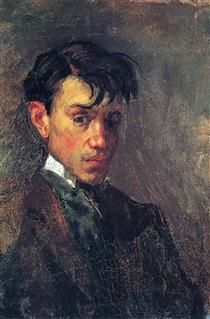You need to know how the existing rules work to break them effectively. Breaking them willy nilly just results in disjointed thoughts and poor word flow. That’s why the teachers try to teach…
Similar to Music theory. It’s not absolutely necessary to write good music, but understanding it allows you to be more purposeful in your writing and know why certain things work and when to break the “rules” for an effect.
Or art for that matter. One of my arts teachers kept saying that, in order to be able to paint the way he did, Picasso would have absolutely been able to paint completely realistic paintings.
I’m still gonna hold my grudge against my middle school art teacher. If we were painting an oak tree for example, she’d get pissed if you decided to add, say, an apple hanging off a branch. “It’s an oak tree, not an apple tree!”. Like I give a fuck, it’s my painting and I wanted an apple there, fuck off.
She also essentially called our entire class lazy and talentless once because none of us got selected as finalists for an art competition she signed us up for.
Our teacher never taught us shit, usually just went like “okay today you draw this” and then went on to do random things and paintings herself. When we drew like shit, she’d say “a 5 year old can do better” gee thanks, that’s helpful. I went to an expensive private school, by the way.
Apparently she never had a teaching degree or whatever it’s called in English (a thing you study for so you are qualified to be a teacher), so I guess she never was supposed to be around kids, at least I’m glad she was not molesting us.
I ran into her recently and learnt the other side of the coin - some time after I had already finished school, she got severely injured by something and was hospitalized and recovering for months, during that time the school fired her (illegal), she sued and won. She then went through two schools and ended up in another private school where she loves her job and everyone loves her there, they do amazing things together. She hated working at my school because they always made her do stupid arts shit for the school, designing posters and whatever and she had to be not just the teacher, but the designer for the entire school and was severely underappreciated.
I’m not happy that the teacher did a bad job teaching us since others somehow managed even with extra work added onto them, but I’m also unhappy with how my prestigious school badly treated some extraordinary teachers, teachers I’ll remember for a lifetime. Maybe my arts teacher would’ve been nice too.
Well, I’d say, it’s only not strictly necessary for small-scale good music. I do think for an orchestra score (or a novel or a Sistine Chapel), you do need to know what you’re doing, because there’s so many variable parts that have to work together…
You don’t need to know what you’re doing, but it’s certainly a heck of a lot easier to understand why your harmony doesn’t work if you know what a tonic and a dominant and subdominant are. It saves you time and allows you to write more purposefully.
I’ve explicitly taught this concept in my English classes, actually.
A run on sentence, for example, is a fantastic tool for expressing overly excited rambling from a character.
It only works for that purpose if the rest of the writing isn’t full of run on sentences.
You have to know the rules and follow them well in order to break them for effect. I told my kids that if they obviously broke a rule for effect in their writing, I wouldn’t hold it against them, but it’d only work if they were otherwise near perfect with that rule.
I had one take me up on it! It was cool. She also wrote a postscript explaining what she did and why, which was hilarious, because it was pretty obvious. She’d used sentence fragments to show incredulity. It was great.
You need to know how the existing rules work to break them effectively. Breaking them willy nilly just results in disjointed thoughts and poor word flow. That’s why the teachers try to teach…
Similar to Music theory. It’s not absolutely necessary to write good music, but understanding it allows you to be more purposeful in your writing and know why certain things work and when to break the “rules” for an effect.
Or art for that matter. One of my arts teachers kept saying that, in order to be able to paint the way he did, Picasso would have absolutely been able to paint completely realistic paintings.
He was, just check his early work.
I’m still gonna hold my grudge against my middle school art teacher. If we were painting an oak tree for example, she’d get pissed if you decided to add, say, an apple hanging off a branch. “It’s an oak tree, not an apple tree!”. Like I give a fuck, it’s my painting and I wanted an apple there, fuck off.
She also essentially called our entire class lazy and talentless once because none of us got selected as finalists for an art competition she signed us up for.
Classic arts teacher stuff.
Our teacher never taught us shit, usually just went like “okay today you draw this” and then went on to do random things and paintings herself. When we drew like shit, she’d say “a 5 year old can do better” gee thanks, that’s helpful. I went to an expensive private school, by the way.
Apparently she never had a teaching degree or whatever it’s called in English (a thing you study for so you are qualified to be a teacher), so I guess she never was supposed to be around kids, at least I’m glad she was not molesting us.
I ran into her recently and learnt the other side of the coin - some time after I had already finished school, she got severely injured by something and was hospitalized and recovering for months, during that time the school fired her (illegal), she sued and won. She then went through two schools and ended up in another private school where she loves her job and everyone loves her there, they do amazing things together. She hated working at my school because they always made her do stupid arts shit for the school, designing posters and whatever and she had to be not just the teacher, but the designer for the entire school and was severely underappreciated.
I’m not happy that the teacher did a bad job teaching us since others somehow managed even with extra work added onto them, but I’m also unhappy with how my prestigious school badly treated some extraordinary teachers, teachers I’ll remember for a lifetime. Maybe my arts teacher would’ve been nice too.
Well, I’d say, it’s only not strictly necessary for small-scale good music. I do think for an orchestra score (or a novel or a Sistine Chapel), you do need to know what you’re doing, because there’s so many variable parts that have to work together…
You don’t need to know what you’re doing, but it’s certainly a heck of a lot easier to understand why your harmony doesn’t work if you know what a tonic and a dominant and subdominant are. It saves you time and allows you to write more purposefully.
I think that applies to any form of art as well. Picassos self portraits are a good example (chronological order)




I agree. Example A:
I’ve explicitly taught this concept in my English classes, actually.
A run on sentence, for example, is a fantastic tool for expressing overly excited rambling from a character.
It only works for that purpose if the rest of the writing isn’t full of run on sentences.
You have to know the rules and follow them well in order to break them for effect. I told my kids that if they obviously broke a rule for effect in their writing, I wouldn’t hold it against them, but it’d only work if they were otherwise near perfect with that rule.
I had one take me up on it! It was cool. She also wrote a postscript explaining what she did and why, which was hilarious, because it was pretty obvious. She’d used sentence fragments to show incredulity. It was great.
Intention is also important. It’s why birdemic is famous and the sequels aren’t.